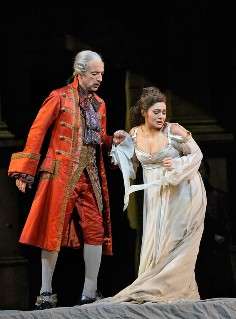|
Back
Star Crossed Shakespearean Opera New York
Metropolitan Opera
04/23/2018 - & April 27*, May 1, 5, 9, 12, 2018
Charles Gounod: Roméo et Juliette
Bogdan Volkov (Tybalt), Bradley Garvin (Paris), Laurent Naouri (Capulet), Ailyn Pérez (Juliette), Joshua Hopkins (Mercutio), Charles Castronovo*/Andrea Shin (Romeo), Maria Zifchak (Gertrude), Jeongcheol Cha (Gregorio), Kwangchul Youn (Frère Laurent), Karine Deshayes (Stéphano), Tony Stevenson (Benvolio), Kevin Short (Duke of Verona)
The Metropolitan Opera Orchestra and Chorus, Plácido Domingo (conductor)
Bartlett Sher (production), Michael Yeargan (sets), Catherine Zuber (costumes), Jennifer Tipton (lights), Chase Brock (choreography)

(© Ken Howard)
The Met’s revival of Charles Gounod’s second most important opera (after Faust) seems to be one of those appositely star crossed revivals. Brought back as a vehicle for the rising star tenor Bryan Hymel, it suffered the first blow when Hymel withdrew from the entire run due to a serious illness. At its opening on April 23, Hymel’s replacement Charles Castronovo also withdrew, leaving the young tenor Andrea Shin to open the revival. Castronovo came back to sing the performance of April 27 and delivered a perfectly adequate if far from thrilling performance as Roméo. The craft and technique were there, and certainly suitable for Mozart, but one rarely felt much passion radiating on the stage. His Juliette, the lovely young soprano Ailyn Pérez, seemed a bit off from her early season performances in another alluring French role, Massenet’s Thaïs. The introductory coloratura aria “Je veux vivre,” set to a dazzling waltz rhythm, was chirpy with wavering pitches. At times the voice ascended to engaging heights, but it was hard to imagine someone killing himself for such a Juliette. The best voiced character by far was Kwangchul Youn’s Frère Laurent – steady, solid bass tones gave the cleric the necessary gravitas and avoided the muddiness that too many second-rate singers have brought to the role. Laurent Naouri’s Capulet registered a quality character performance. It was unfortunate to see the promising Karine Deshayes confined to the part of Stéphano.
The cast did not get much help from the evening’s conductor, opera megastar Plácido Domingo. His approach offered some degree of nuance but never reached any truly compelling dimension of intimacy. One might have guessed that his intention was to reveal the characters’ psychological dimensions, but they remained static on stage. More fault lay in Bartlett Sher’s somber production, which served the concluding death scene but made Verona look gloomier than a site of blossoming love, and indeed gloomier than Verona really is. In another tragic Gelb-era mistake, this charmless production for no readily discernible reason replaced a short-lived but very memorable staging.
Paul du Quenoy
|